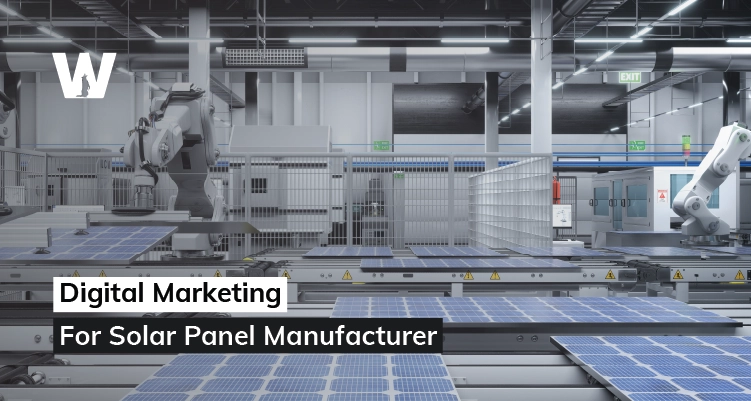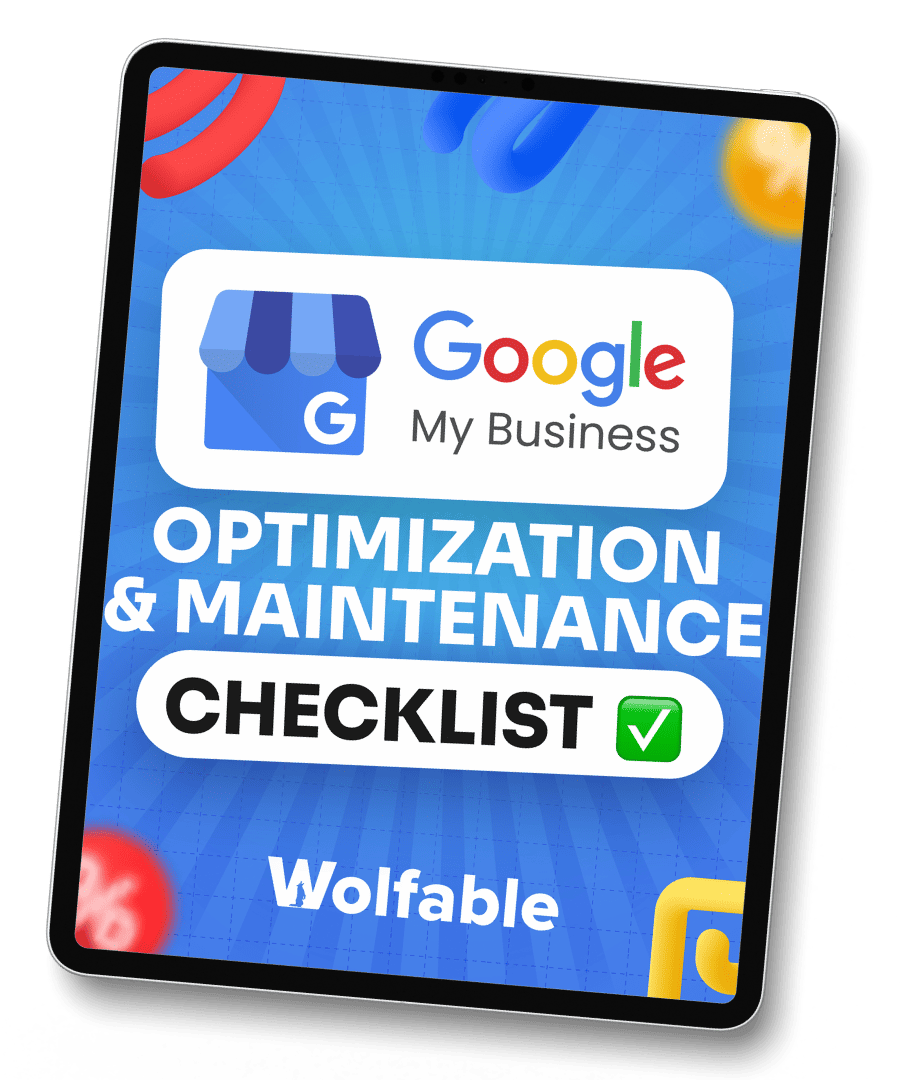Wraps up in 13 Minutes
Introduction
The solar manufacturing industry is witnessing remarkable growth, with global solar panel production surging by 25% year-on-year over the past decade. This expansion is fueled by increasing environmental concerns, government subsidies, and the global transition to renewable energy. As competition grows, solar panel manufacturers must find innovative ways to stand out.
For solar panel manufacturers, digital marketing has become a critical tool for success in today’s competitive environment. With over 80% of consumers turning to online research before making a purchase, a strong digital presence is essential. Strategies like SEO, social media campaigns, and targeted advertising can help manufacturers connect with both residential and commercial customers.
A specialized digital marketing agency brings expertise in addressing the unique hurdles of solar manufacturing, such as seasonal demand and complex buyer decisions. For instance, they can optimize a company’s website to rank for location-specific searches like "best solar panel manufacturers," helping to attract high-quality leads. Customized strategies like these ensure measurable growth and sustained success in the market.
Understanding Customers and Their Needs for Solar Panel
Understanding the diverse needs of customers is essential for success in a competitive market. From cost-conscious homeowners to businesses seeking scalable solutions, customized marketing efforts ensure better engagement and higher conversions. Recognizing motivations like cost savings and environmental impact can help manufacturers craft impactful strategies.
- Cost vs. Environmental Motivation
Solar adoption is often driven by two main factors—saving money and protecting the environment. A report by EnergySage reveals that 76% of residential solar buyers prioritize reducing energy costs, while 24% focus on lowering their carbon footprint. Solar panel manufacturing companies can address both motivations by highlighting long-term savings alongside environmental benefits in their marketing. For example, showcasing calculators that estimate energy savings can attract cost-conscious buyers. - Residential vs. Commercial Markets
Homeowners and businesses have distinct needs when investing in solar solutions. Residential buyers often look for affordable, easy-to-install systems, while commercial customers prioritize efficiency and scalability. Solar manufacturing companies can create customized marketing campaigns, such as ads focusing on financing options for homeowners or case studies for businesses that have achieved significant savings. - The Solar Customer’s Journey
The solar buyer’s journey typically includes stages of awareness, consideration, and decision-making. During the awareness stage, customers seek information like "how solar panels work" or "solar incentives near me." Solar panel manufacturers can engage them by creating educational blogs and videos. In the decision-making phase, testimonials and warranty details can help build trust and close deals. - Seasonality in Solar Marketing
Solar demand often peaks in summer, with homeowners seeking energy savings as temperatures rise. However, manufacturers can maintain engagement during slower seasons by promoting benefits like tax incentives or preparing for future energy costs. For instance, running winter campaigns on "preparing your home for solar in spring" can keep your brand top-of-mind year-round. - Research Mode vs. Buying Mode
Many solar customers spend months researching before committing to a purchase. Solar panel manufacturing companies can cater to these different stages by offering in-depth guides for researchers and limited time offers for those ready to buy. For example, content like "5 Things to Know Before Installing Solar Panels" helps researchers, while ads like "Get Free Installation This Month" appeal to buyers in decision mode.
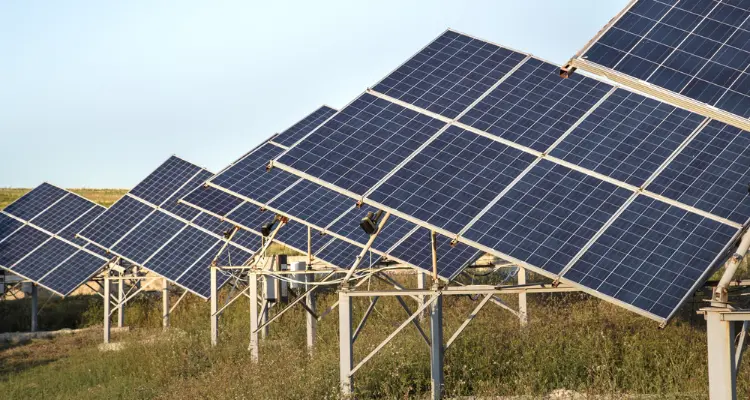
Solar Industry Trends Impacting Marketing Strategies
As the solar industry evolves, several key trends are reshaping marketing strategies for manufacturers. From the rise of smart energy systems to the growth of electric vehicle adoption, these shifts present new opportunities and challenges. Solar panel manufacturers must adapt their marketing to stay ahead of these changes and engage a more informed, eco-conscious audience.
- Rise of Smart Energy Systems
The integration of batteries and smart home technologies with solar panels is transforming the solar manufacturing landscape. According to BloombergNEF, global battery storage installations are projected to grow tenfold by 2030. Solar panel manufacturers can highlight these innovations in their marketing, such as promoting solar-plus-storage solutions that provide energy independence and backup power during outages. - EV Adoption and Solar Growth
The rapid adoption of electric vehicles (EVs) is creating new opportunities for solar panel manufacturers. Reports indicate that EV sales will surpass 14 million globally in 2024, with many buyers exploring solar installations to power their vehicles. Solar companies can bundle solar panels with EV chargers, offering cross-promotional deals like "Charge Your EV with Solar Energy" to attract eco-conscious customers. - Increasing Consumer Awareness
Today's buyers are more informed than ever, researching products extensively before making decisions. A study by Google shows that 63% of online buyers actively compare options before purchase. Solar panel manufacturing companies can engage this audience by creating content like blogs, videos, and FAQs addressing topics such as "solar panel efficiency" or "how solar reduces energy costs." - Implications for Solar panel Manufacturers
For solar panel manufacturers, these trends highlight the need for customized, data-driven digital campaigns. For instance, targeting ads on platforms like Google or LinkedIn to EV owners can yield high ROI. Additionally, showcasing customer stories about integrating solar with smart energy systems can build credibility and inspire potential buyers. By aligning marketing efforts with these trends, Solar panel manufacturers can stay ahead in the dynamic solar industry.
Why Solar Panel Manufacturers Need Digital Marketing for their Growth
Partnering with a digital marketing agency can provide solar panel manufacturers with the expertise and strategies needed to navigate the competitive landscape. By leveraging industry-specific knowledge, data-driven insights, and scalable solutions, manufacturers can enhance their brand visibility, drive more leads, and achieve higher marketing ROI.
- Access to industry-specific expertise and proven strategies.
A digital marketing agency with experience in solar manufacturing understands the industry's unique challenges, such as complex customer journeys and seasonality. According to a report by Solar Power World, nearly 90% of solar panel manufacturers rely on online marketing to generate leads. Partnering with an agency ensures customized strategies that address these specific needs, whether it's optimizing content for "solar panel installation" or crafting ads for eco-conscious buyers. - Enhanced brand visibility in a competitive marketplace.
In the competitive solar manufacturing market, increasing brand visibility is crucial. Studies show that 75% of customers never scroll past the first page of search results, making SEO crucial. A digital marketing agency can help solar panel manufacturers rank higher on search engines by optimizing keywords like "solar panel manufacturers" and "solar solutions for businesses," ensuring their brand reaches the right audience at the right time. - Data-driven decision-making to maximize marketing ROI.
Digital marketing agencies use data analytics to continuously optimize campaigns for better ROI. With tools like Google Analytics, agencies can track customer behavior and adjust strategies in real time. For instance, if a solar manufacturing company's website sees more traffic from certain locations, the agency can target ads to those regions, maximizing ad spend efficiency and conversion rates. - Cost-effective, scalable solutions customized to business needs.
For solar panel manufacturers, partnering with a digital marketing agency offers scalable solutions that grow with the business. Rather than investing in expensive traditional marketing methods, agencies provide cost-effective options like social media ads or email marketing, which can be customized to fit the company’s budget and goals. Whether a small manufacturer is looking to expand or a large business seeking national recognition, digital marketing offers flexibility and measurable results.
Essential Digital Marketing Strategies for Solar Manufacturing Industry
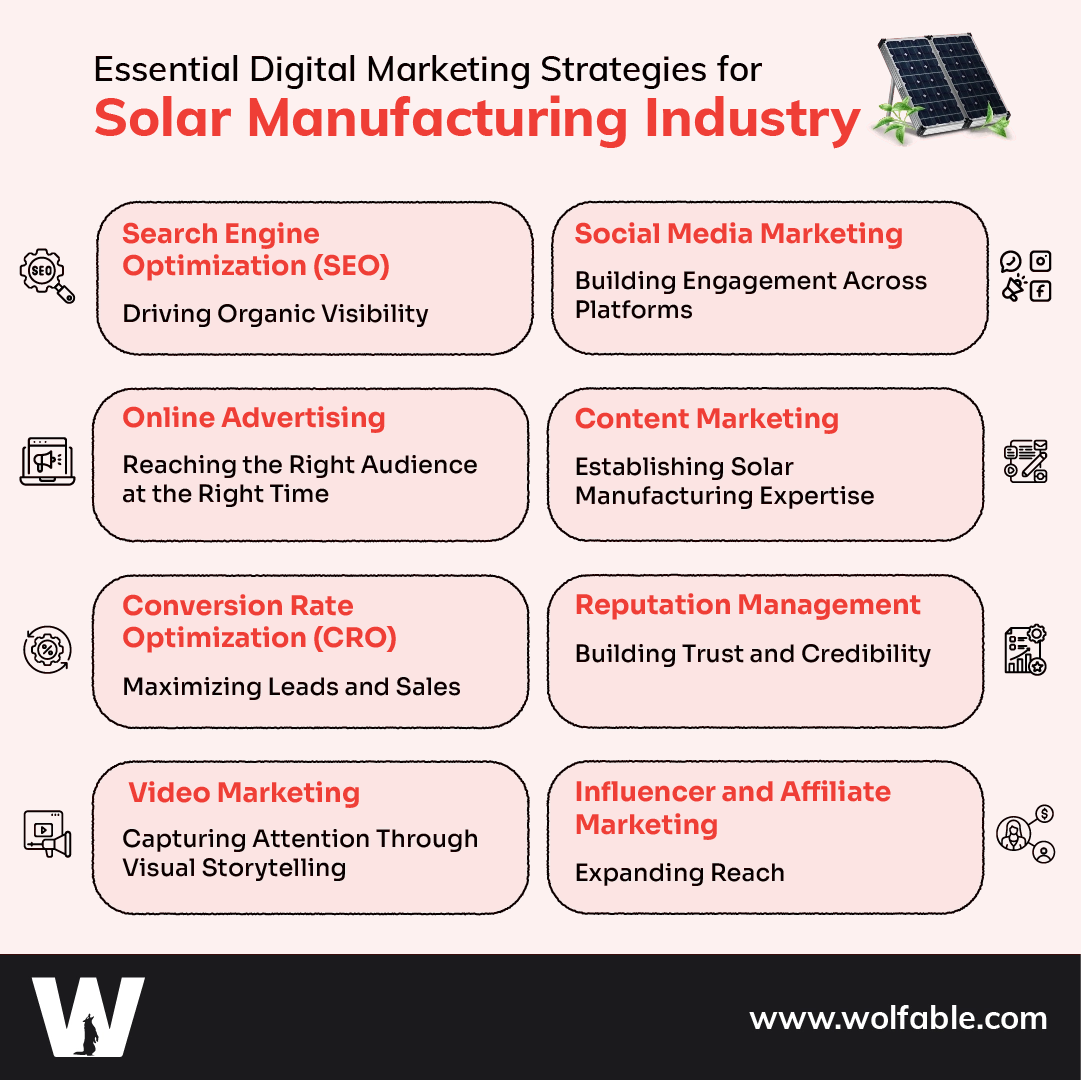
1. Search Engine Optimization (SEO): Driving Organic Visibility
SEO is crucial for solar manufacturing companies to improve organic search rankings and reach their target audience. According to HubSpot, 75% of users never scroll past the first page of search results. By optimizing for solar-specific keywords like “solar panel manufacturers” and “solar installation services,” companies can significantly enhance visibility and drive qualified traffic to their websites.
- On-Page SEO for Solar Manufacturing Websites
Optimizing meta tags, headers, and URLs with relevant solar manufacturing keywords ensures that search engines properly index your content. For example, using terms like "affordable solar solutions" or "solar energy systems" in headers and meta descriptions can boost rankings. Additionally, creating location-based landing pages such as "solar installation in California" helps attract local customers searching for nearby services, improving regional visibility.
Enhancing content readability and maintaining keyword density are also Important. Google prioritizes content that is easily readable and informative. Incorporating key phrases naturally into blogs, FAQs, and service pages allows for better user engagement while improving search engine rankings. - Off-Page SEO for Solar Manufacturing Websites
Off-page SEO is all about building authority and increasing trust through external sources. Solar panel manufacturers can enhance their backlink profile by partnering with green energy blogs and industry publications, which improve site credibility and search ranking. Engaging in discussions on renewable energy forums and contributing articles to well-respected sites further boosts visibility and establishes expertise in the field. - Technical SEO for Solar Manufacturing Websites
Technical SEO ensures that the website functions smoothly, providing an excellent user experience while helping search engines crawl and index the site. Google research shows that 53% of mobile users abandon a site if it takes longer than 3 seconds to load. Ensuring fast load times and mobile optimization is crucial, as solar panel manufacturers often target mobile users researching on the go.
Implementing schema markup for solar-related products, like solar panels or inverters, helps search engines understand the content better and display rich snippets. Additionally, fixing crawl errors and enhancing site architecture improves overall SEO health, ensuring that search engines can easily index important pages like product listings and case studies.
2. Social Media Marketing: Building Engagement Across Platforms
Social media marketing plays a crucial role for solar panel manufacturers in connecting with their target audience and enhancing brand presence. By leveraging various platforms, they can showcase their products, share valuable insights, and foster engagement. Effective platform-specific strategies can help solar companies reach a wider audience and build lasting customer relationships.
- Platform-Specific Strategies:
Instagram is an ideal platform for showcasing visually compelling solar manufacturing projects, like before-and-after shots of solar panel installations. A study by Hootsuite found that 60% of Instagram users discover new products on Instagram, making it perfect for highlighting customer testimonials and the environmental benefits of solar solutions. Sharing images of successful solar installations can help manufacturers build trust and engage with eco-conscious consumers.
On Facebook, solar panel manufacturers can promote educational content such as videos explaining the benefits of solar energy or how solar panels work. Hosting live sessions or Q&A's can increase direct engagement with the audience. Contests or giveaways related to solar products also encourage interaction and attract new customers, with Facebook reporting a 32% higher engagement rate for posts that include interactive content.
LinkedIn is the go-to platform for B2B marketing, allowing solar panel manufacturers to network with decision-makers in the commercial sector. By publishing industry insights, sharing case studies, and targeting specific industries like real estate or construction, manufacturers can build authority and connect with potential partners. According to LinkedIn, 80% of B2B leads come from this platform, making it crucial for commercial solar outreach.
Twitter is a great tool for sharing quick updates on solar trends, rebate opportunities, or new government policies affecting the solar industry. With its fast-paced, real-time nature, it’s ideal for manufacturers to stay top of mind by engaging in conversations about emerging solar technologies or sustainability practices. For example, sharing solar tax incentive information can help educate potential customers on the financial benefits of adopting solar energy.
- Creative Campaign Ideas:
Running campaigns around global eco-events like Earth Day.
Campaigns centered around eco-focused events like Earth Day can be a powerful way for solar panel manufacturers to align their brand with sustainability. Creating content that highlights how solar energy contributes to a greener planet can resonate with environmentally conscious customers. For instance, showcasing solar projects that reduce carbon footprints or providing Earth Day discounts can help boost engagement and brand loyalty.
Sharing success stories with a focus on environmental impact.
Solar panel manufacturers can further build their brand by sharing customer success stories that emphasize the environmental impact of switching to solar power. A case study showing how a business reduced its carbon emissions through solar panel installation can inspire others to follow suit. Research from the Solar Energy Industries Association (SEIA) shows that consumers are increasingly making environmentally driven decisions, which makes sharing such stories especially impactful.
Using user-generated content
Encouraging customers to share their solar experiences on social media can create authentic, user-generated content (UGC). When customers post pictures of their solar installations or share their savings stories, it acts as organic advertising. Solar panel manufacturers can incentivize UGC by offering rewards for sharing, which builds a community of brand advocates and helps spread the word about their solar solutions.
3. Online Advertising: Reaching the Right Audience at the Right Time
Online advertising is essential for solar panel manufacturers to reach their target audience effectively. By leveraging platforms like Google, Meta, and LinkedIn, companies can drive brand visibility and conversions. Customized ad strategies ensure solar brands engage with the right customers at the right time.
- Google Ads
Google Ads offers a powerful tool for solar panel manufacturers to target high-intent keywords like “best solar panel manufacturers near me.” By focusing on search queries from users actively looking for solar solutions, manufacturers can ensure they are visible when potential customers are ready to convert. A well-crafted display ad campaign can also retarget website visitors, keeping the brand top-of-mind. For example, a solar company could optimize ad copy to highlight limited-time offers, such as tax incentives or financing options, which could increase conversions and drive sales. - Meta Ads (Facebook & Instagram)
Meta Ads on Facebook and Instagram are ideal for promoting seasonal offers or new product launches in the solar industry. Carousel ads, which allow users to swipe through multiple images or offers, can be used to highlight different solar solutions or success stories. For example, a solar manufacturer could showcase a range of solar panels with unique features, while also featuring customer testimonials to build trust. Meta’s targeted advertising capabilities help manufacturers reach the right audience, whether they are eco-conscious consumers or business owners seeking energy-efficient solutions. - LinkedIn Ads
LinkedIn Ads offer a great way for solar panel manufacturers to connect with B2B buyers and industry professionals in the commercial solar market. By promoting whitepapers or case studies, manufacturers can establish their authority and demonstrate their expertise in solar technology. LinkedIn’s targeting options allow solar companies to reach decision-makers in industries like real estate and construction, increasing the likelihood of business partnerships. For instance, a solar company might promote a case study about their successful installation in a commercial building, showcasing the financial and environmental benefits for potential commercial clients.
4. Content Marketing: Establishing Solar Manufacturing Expertise
Content marketing is vital for solar panel manufacturers to establish authority and build trust with their audience. By offering valuable resources such as blogs and case studies companies can engage potential customers and demonstrate their expertise. This approach not only educates but also drives conversions and enhances brand visibility.
- Informative Blogs
Informative blogs play a critical role in educating potential customers about solar manufacturing. Topics like "How do solar panels work?" or "Benefits of solar for businesses" not only provide value but also help improve SEO rankings by answering common search queries. For instance, a blog post detailing how solar panels convert sunlight into electricity can attract users researching solar technology, enhancing both organic traffic and customer engagement. - Ebooks and Whitepapers
Ebooks and whitepapers offer in-depth resources that can establish a solar manufacturer's authority. A whitepaper on topics such as “solar ROI” or “understanding government incentives for solar installation” can be a valuable resource for both residential and commercial buyers. By providing comprehensive information, manufacturers can build trust, and capture leads through downloadable content, which helps nurture potential customers toward making a purchase decision. - Case Studies
Case studies offer compelling real-world evidence of the impact solar solutions can have. Sharing success stories from your own installations demonstrates the tangible benefits of solar energy for both businesses and homeowners. For example, a case study showcasing how a commercial building reduced energy costs by 30% with solar panels can resonate strongly with businesses seeking sustainable solutions and a clear return on investment. - Video Content
Video content is a powerful tool in the solar manufacturing industry, offering a visual and engaging way to demonstrate products and services. Tutorials on solar panel installation or customer testimonial videos help build trust and educate potential buyers. A video walkthrough of an easy-to-follow solar panel installation process can alleviate concerns for new customers, especially when they see real people share their positive experiences with the product. - Interactive Tools
Interactive tools, such as solar savings calculators, engage potential customers while providing them with personalized insights. For example, a savings calculator that estimates how much a residential customer could save annually by installing solar panels can drive interest and help potential buyers envision the financial benefits. These tools not only enhance customer experience but also keep users engaged on the website longer, which can improve SEO rankings.
5. Conversion Rate Optimization (CRO): Maximizing Leads and Sales
Conversion Rate Optimization (CRO) is crucial for solar panel manufacturers to turn website visitors into loyal customers. By refining user experience and implementing data-driven strategies, manufacturers can boost leads and sales. Simple changes, like streamlining navigation or testing CTAs, can have a significant impact on conversion rates.
- Streamline Website Navigation Streamlining website navigation ensures potential customers can easily find solar products and services, improving their overall experience. For example, if your solar manufacturing company simplifies the process to request a quote or browse solar panel options, users are more likely to convert. A well-organized website helps reduce bounce rates and keeps visitors engaged, ultimately increasing lead generation.
- Add Live Chat for Real-Time Customer Engagement Adding live chat functionality enables real-time engagement with customers, answering their questions immediately. Solar panel manufacturers can use this feature to provide personalized advice or product details. This direct interaction has been shown to increase conversion rates by up to 40%, as potential customers feel more confident and supported during their buying journey.
- Test different CTAs Testing various call-to-action (CTA) buttons can significantly impact on your website’s conversion rate. For instance, using a CTA like "Get a Free Quote" versus "See Your Savings" can appeal differently to various customer segments. A/B testing allows solar panel manufacturers to identify which phrases resonate best with their audience, leading to higher engagement and more conversions.
- Personalize landing pages Personalizing landing pages based on customer segmentation can increase the likelihood of conversions. For example, a landing page customized to commercial buyers might highlight the cost savings and efficiency of solar systems for businesses. Personalization ensures that users see content that aligns with their needs, helping to increase both leads and sales.
- Use analytics to identify drop-off points Analytics tools are essential for tracking user behavior and identifying where visitors drop off in the conversion process. Solar panel manufacturers can use this data to optimize the user journey, whether it's simplifying a form or reducing the number of steps in the checkout process. By addressing these drop-off points, companies can improve user experience and increase conversion rates.
6. Reputation Management: Building Trust and Credibility
In the competitive solar panel manufacturing industry, reputation management is key to building trust and credibility with customers. By actively managing your online presence and showcasing your achievements, you can establish a strong brand image that attracts and retains loyal customers. Here's how you can enhance your reputation and stand out in the renewable energy sector.
- Reputation Management in Solar Panel Manufacturing
Reputation management is crucial for solar panel manufacturing companies, as trust plays a significant role in consumer decisions. Actively monitoring online reviews on platforms like Google and Yelp can help you stay connected with your customers and address any concerns promptly. Studies show that 88% of consumers trust online reviews as much as personal recommendations, making it essential to maintain a positive online presence. - Engaging with Customer Feedback for Trust Building
Responding to customer feedback not only demonstrates your commitment to quality but also helps improve your company's reputation. For example, if a customer leaves a review mentioning their satisfaction with your solar panels’ performance, a quick response acknowledging their feedback can reinforce trust in your brand. Regularly engaging with customers can build loyalty and a positive image, setting you apart in the competitive solar manufacturing industry. - Showcase Certifications, Awards, and Testimonials
Highlighting certifications, awards, and testimonials is a powerful way to boost your company's credibility. For instance, displaying your ISO certification or awards from reputable organizations on your website can provide potential customers with confidence in the quality and reliability of your solar products. According to a survey by BrightLocal, 74% of consumers trust a business more if it has positive certifications or affiliations. - Influencer Partnerships: Expanding Your Reach in the Solar Industry
Collaborating with influencers in the renewable energy space can further solidify your company's position as an industry leader. Working with well-known figures can amplify your message and help you reach a broader audience. Solar panel manufacturers like SunPower have leveraged influencer partnerships to increase brand awareness and trust in their products, especially within the green energy community. - Leveraging Press Mentions and Industry Recognition
Sharing press mentions or industry recognitions through social media and blogs is a smart strategy to showcase your company’s accomplishments. If your solar manufacturing company has been featured in a leading industry publication or recognized for innovative products, sharing this on platforms like LinkedIn and Twitter can elevate your reputation. A strong digital presence can also ensure that potential customers find accurate and positive information about your brand when they search for solar manufacturing companies online.
7. Video Marketing: Capturing Attention Through Visual Storytelling
Video marketing is an essential tool for solar manufacturing companies to engage customers and showcase their products in a relatable way. One effective strategy is creating "Day in the Life of Solar Panel Installation" videos. These videos can provide an inside look at how solar panels are installed, showcasing the professionalism and care involved in the process. According to Wyzowl, 83% of businesses believe video gives them a good ROI, making it a must-have tool in your marketing strategy.
- Showcase product durability and efficiency with time-lapse content.
Time-lapse videos are another powerful way to highlight the durability and efficiency of solar panels. By showing solar panels in action over time, you can demonstrate how they withstand various weather conditions and continue to perform optimally. Companies like Tesla have used time-lapse videos to showcase the reliability of their solar products, helping to build trust and confidence in their brand. - Use animated explainers for complex topics like net metering or grid independence.
Explaining complex topics like net metering or grid independence can be challenging, but animated explainer videos make it easier for your audience to understand these concepts. For instance, an animated video breaking down how solar energy is stored and used in a grid-independent system can significantly increase engagement. According to Animoto, 93% of businesses gained a new customer because of a video on social media, showing that clear, informative videos are effective in driving interest in solar manufacturing solutions.
8. Influencer and Affiliate Marketing: Expanding Reach
Influencer marketing is a powerful strategy for solar manufacturing companies to expand their reach. Partnering with eco-bloggers, tech influencers, and sustainability advocates allows your brand to tap into engaged audiences who value renewable energy. For example, companies like SunPower have partnered with green energy influencers to amplify their message and increase trust in their solar solutions. Studies show that 49% of consumers depend on influencer recommendations for purchasing decisions, making it a key channel in the solar sector.
- Partner with eco-bloggers, tech influencers, and sustainability advocates.
Partnering with eco-bloggers, tech influencers, and sustainability advocates is a strategic way to amplify your solar manufacturing brand’s message. These influencers already have an engaged audience interested in renewable energy, making them the perfect partners for promoting solar products. For example, by collaborating with influencers like Leah Thomas, a prominent eco-activist, brands can connect with sustainability-conscious consumers. According to Influencer Marketing Hub, 89% of marketers find influencer marketing to be effective, showing that it’s an impactful method for building trust and reaching a wider audience in the solar industry. - Set up affiliate programs for solar consultants and installers.
Setting up affiliate programs for solar consultants and installers is another effective way to expand your brand’s reach. These programs allow industry experts to promote your products in exchange for commissions, driving both sales and awareness. For instance, SolarCity’s affiliate program has enabled it to scale its solar installations by leveraging a network of independent consultants. According to a study by Rakuten, affiliate marketing generates 16% of all online sales in the US, showcasing its potential in the solar manufacturing industry.
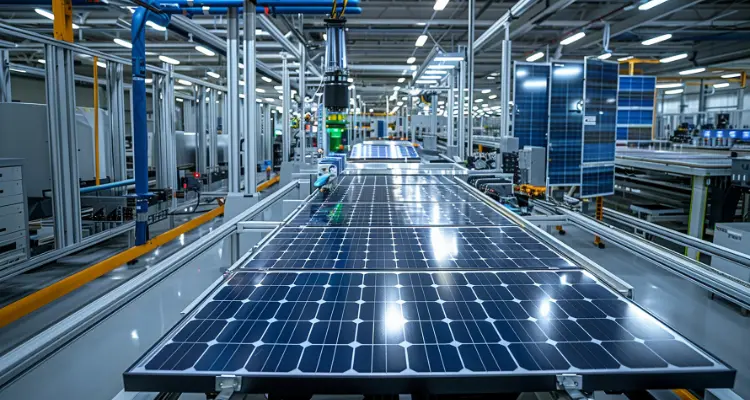
How a Digital Marketing Agency Elevates Solar Manufacturing Businesses
In today’s competitive renewable energy market, a digital marketing agency plays a pivotal role in elevating solar manufacturing businesses. By leveraging industry expertise, advanced tools, and data-driven strategies, agencies help solar panel manufacturers overcome challenges and maximize their growth potential across digital platforms.
- Expertise in handling industry-specific challenges
A digital marketing agency provides expertise in navigating industry-specific challenges such as seasonality and purchase cycles. For solar manufacturing, understanding the peak demand periods—such as during government rebate seasons or energy conservation awareness months—can significantly boost lead generation. According to Statista, the global solar market is projected to grow by 20.5% annually, making timely and targeted marketing essential for capturing market share. - Access to advanced tools for campaign tracking and analytics
With access to advanced tools for campaign tracking and analytics, a digital marketing agency enables solar panel manufacturers to fine-tune their efforts for maximum effectiveness. Using platforms like Google Analytics and SEMrush, agencies can monitor traffic patterns, customer behavior, and campaign performance, providing actionable insights to optimize strategies. These tools ensure that solar brands can stay ahead of trends and improve ROI through data-backed decisions. - Ability to craft data-driven campaigns that deliver measurable results.
Crafting data-driven campaigns that deliver measurable results is a core strength of a digital marketing agency. By leveraging customer data and insights, agencies create targeted campaigns that focus on high-conversion actions, such as purchasing solar panels or requesting quotes. A case study from SolarCity showed that targeted email marketing increased their customer engagement by 60%, proving that data-driven approaches in solar manufacturing can lead to tangible outcomes. - Support in creating a cohesive marketing strategy
Digital marketing agencies offer support in creating a cohesive marketing strategy that aligns with business goals, ensuring all efforts work towards a unified objective. Whether aiming for increased awareness, lead generation, or sales conversions, the agency ensures that SEO, content marketing, and paid media work together. This alignment helps solar panel manufacturers build a consistent brand presence while driving long-term growth in the competitive renewable energy sector.
You might be interested in :
Why Choose Wolfable for Solar Manufacturing Digital Marketing?
Wolfable stands out as the Best Manufacturing Digital Marketing Agency, offering specialized services for solar panel manufacturers. With years of experience in both B2B and B2C marketing, Wolfable understands the unique needs of solar brands, whether they’re focusing on wholesale or direct-to-consumer markets. Our customized strategies ensure that solar panel manufacturers can effectively reach their target audience and drive growth across digital platforms.
- Industry Expertise in B2B and B2C Marketing
As the Best Manufacturing Digital Marketing Agency, Wolfable’s deep industry expertise in both B2B and B2C digital marketing for solar panel manufacturers sets us apart. By combining advanced SEO tactics with content marketing, we ensure solar panel manufacturers increase their visibility in both sectors. Our campaigns are designed to engage business clients while building a strong direct relationship with consumers, providing a comprehensive approach that accelerates brand growth and awareness in the renewable energy market. - Proven Track Record of Successful Campaignsg
With a proven track record of successful campaigns, Wolfable, has helped solar panel manufacturers improve their digital presence and generate high-quality leads. Our data-driven approach consistently delivers measurable results. By optimizing digital strategies, we empower solar panel manufacturers to scale their operations efficiently and achieve long-term success in a rapidly evolving industry. - Customized Solutions for Solar panel Manufacturers
At Wolfable, the Best Manufacturing Digital Marketing Agency, we recognize that every solar manufacturer has unique goals and challenges. That’s why we offer customized solutions to the specific needs of your business. Whether you're a local solar brand or a global manufacturer, our strategies are designed to maximize ROI through targeted digital campaigns, SEO optimization, and social media engagement that resonate with your ideal audience and drive conversions. - A Leading Digital Marketing Agency for Global and Regional Solar Brands
Wolfable’s expertise extends beyond regional markets to global solar brands looking to expand their reach. Our international experience allows us to navigate complex global digital marketing strategies, helping solar panel manufacturers gain visibility in competitive markets. Wolfable is the trusted partner for solar brands aiming for global success.
Conclusion
Digital marketing is a necessity for solar panel manufacturers in today’s competitive landscape. It plays a crucial role in enhancing brand visibility, driving customer engagement, and staying ahead of industry trends in the renewable energy sector. A well-structured digital marketing strategy can transform how your solar manufacturing business connects with potential clients, showcasing your expertise and unique products.
With the solar industry embracing digital transformation, leveraging tools like SEO, social media marketing, and data analytics can significantly improve your online presence and ROI. Wolfable is the Best Manufacturing Digital Marketing Agency that ensures you gain access to customized strategies that drive measurable results for your solar panel manufacturing business.
Ultimately, digital marketing for the manufacturing industry is about more than just promotions; it’s about building a strong and trusted brand presence in the digital space. By partnering with Wolfable, you can confidently position your solar panel manufacturing business for sustained growth and success in the evolving marketplace.


